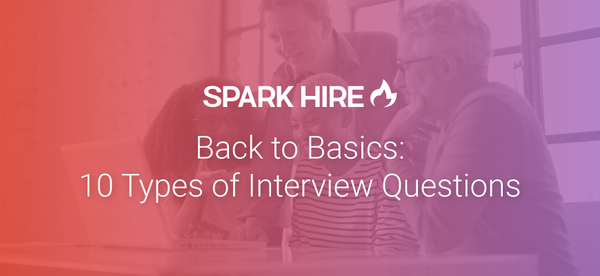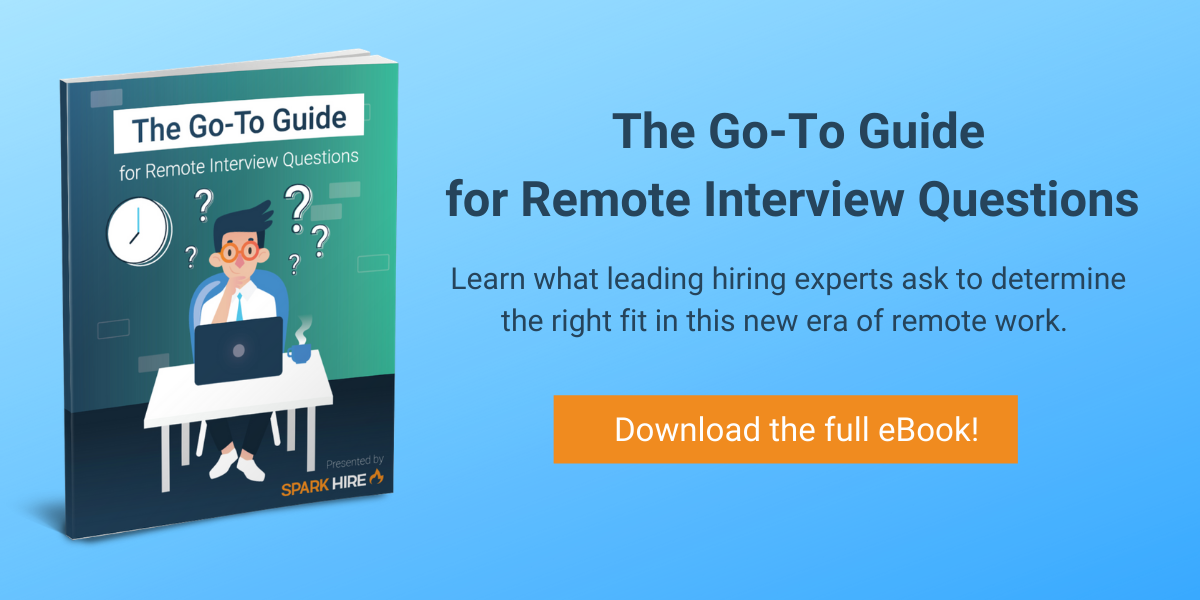By now, you probably have a hundred interview questions neatly organized in your handy-dandy interview binder. But that’s not enough. All the best questions in the world won’t improve your performance on the job if you don’t know how to use different types of interview questions to your advantage.
Each type of question serves a unique role in gathering information about a candidate. But the questions you ask also tell candidates a lot about the company. They want evidence the position they’re going for would challenge them and lead to career growth.
According to Glassdoor’s 2020 study about why candidates reject job offers, Gen Z and millennial candidates are more likely to accept a position if they had a difficult interview. However, only 10.5% of interviews today are considered “difficult.”
It’s time to level up on your interview skills. On its own, finding new questions that would challenge candidates doesn’t add much. You have to start analyzing why you’re asking them and what information they can offer.
To get started, here are 10 types of interview questions you need to know, what they assess, and why they’re essential:
1. Situational
Situational questions put candidates in a made-up scenario that might be similar to something they would face in the position they’ve applied for.
You need to challenge yourself to develop creative situations. These will allow candidates to use their responses to communicate something about their personality, problem-solving skills, communication skills, cultural fit, etc.
With these types of questions, you’re specifically looking for how well a candidate reacts to complex information if they’re able to find solutions, and what their thought process looks like.
If you could only ask each candidate a single question, a situational question is the best to choose out of all the types of interview questions. They are versatile and reveal so much about a person.
Take a look at this example of a situational question and what you can learn from each response: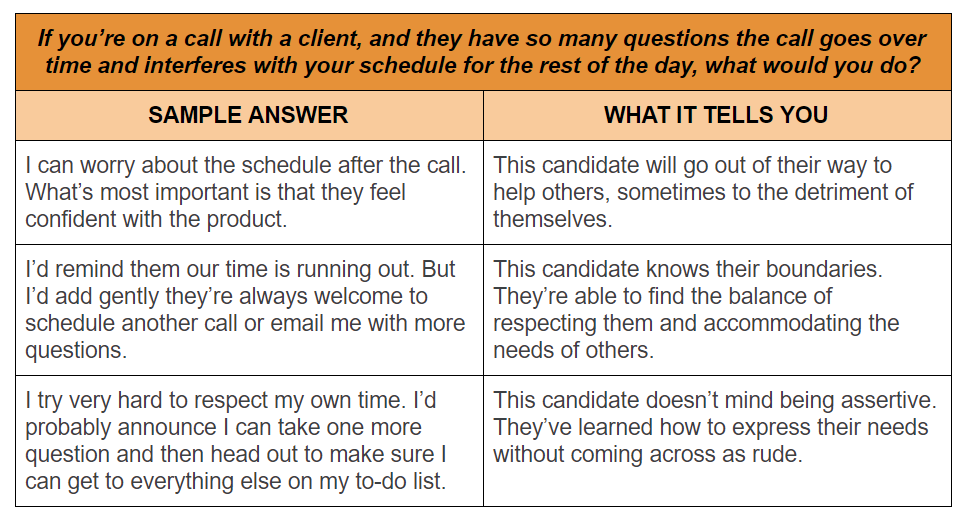
2. Behavioral
Behavioral questions are not hypothetical. These look to the past, and they’re based on the premise that previous performance is the best indicator of future behavior.
Of the types of interview questions, this one requires candidates to share examples of specific situations they’ve encountered. Similar to situational questions, they offer candidates the opportunity to highlight skills. Here, however, they have to back it up with concrete evidence.
Remember, you’re using these questions to understand the candidates’ reaction to a stressful situation they’ve already experienced. They may not have an example of when they did everything right, but that can still work in your favor. It gives you the chance to hear how they discuss past mistakes:
- If they handled the situation poorly and, as they talk about it, try to defend themselves as they explain what happened, they may struggle with accountability.
- However, if they handled the situation poorly and learned from it, that demonstrates self-awareness, ability to reflect critically, and growth.
Check out this summary of the differences between situational and behavioral questions. 
3. Cultural fit
Interview questions about cultural fit determine whether a candidate will blend well with the organization’s established culture.
Why do you need to ask these questions? For one, hiring candidates who have a better chance of feeling happy in the work culture increases the company’s value.
In a 2019 study, Glassdoor assessed what culture is worth. They discovered that rising 10 places in the ranks of Glassdoor’s Best Places to Work is associated with a 1.7 percentage point increase in annual stock returns. And it’s not because Glassdoor featured them on a list; it’s because better employee satisfaction is linked to better performance.
During the interview, avoid prompts that only require a yes or no answer. These types of interview questions can lead the candidate to offer a response they think you want to hear. And you’ll never find a good cultural fit from cookie-cutter answers.
Instead of: This position requires a lot of independent work. Do you think that would be difficult for you?
Ask: How much input do you like to get from others when working on a big project?
Why? The second question still encourages the candidate to talk about their comfortability with independent work and how they value feedback from others. But, unlike the first question, it doesn’t hint what the “right answer” would be for this position.
4. Values
Looking at 2019 research from Glassdoor, there are three main components to employee satisfaction in the U.S. The strongest predictor? Culture and values of a company.
We just addressed types of interview questions that assess cultural fit. That deals with the general atmosphere of the workplace and interaction among team members. Values, on the other hand, speak more to the priorities of the company.
Questions about values gauge if there’s a match between what’s important to the candidate and the company.
Follow these steps to construct substantial interview questions for this category:
- Determine which value you want to target.
- Decide if you’re going to ask about it directly or indirectly.
- Figure out what ideas would be included in an ideal response.
- Write out two or three questions that could lead to that response.
- Select which best targets the value.
- Anticipate various responses.
- Make sure the anticipated responses help you assess the targeted value.
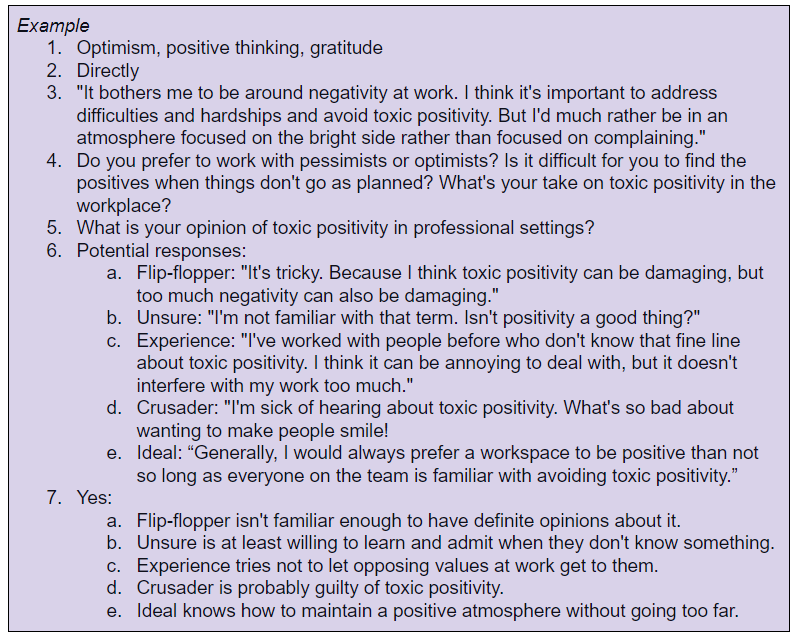
5. Generalized skillset
The Glassdoor data about why candidates reject job offers indicates candidates appreciate when interviews include a skills test. It allows them to showcase their expertise. And they have a better perception of employers who use skills tests over those who use IQ or personality tests.
Even if your company isn’t fond of using any tests for interviews, it’s still a good idea to pay special attention to the candidate’s skill set. It gives them an excellent chance to highlight points they didn’t have space to elaborate on in their application, and it helps you analyze if those skills fit the needs of the position.
Luckily, many types of interview questions focus on skills. The first category to know is generalized skill sets. These require specific examples of a time the candidate demonstrated a particular attribute.
For example, if you know this job is best suited for someone with a lot of patience, frame a question or two around that idea. The candidate gets a chance to share a relevant anecdote, and you gain evidence regarding one specific skill crucial to the position.
6. Technical skills
Questions about technical skills assess how prepared a candidate would be to take on the roles and responsibilities specific to the position.
Here, there’s no point in being indirect or vague. Ask how comfortable they would be completing X complex task, and pay attention to how well they understand the jargon. You can also note how intimidated they appear when you ask if they think their experience has prepared them for this position.
The best candidates aren’t always the ones who fit the qualifications to a T. But you need to ensure they can at least hold their own in what the job would require of them.
Use different question set lists targeting the technical skills of each open position. Check out these lists we’ve compiled for you as examples:
- Must-Ask Internship Interview Questions
- Questions to Ask Healthcare Candidates
- Most Revealing Interview Questions to Ask Web Developers
7. Business skills
Business skill questions gauge how familiar the candidate is with industry-specific topics. They can also be company-specific depending on how involved the position is in those procedures.
For example, you could ask what they believe is the role of this position in an organization, have them define a complex idea critical to the field, and check if they can differentiate between different processes.
What’s most important is to design these questions in a way that will prove they know more than just the basics. It depends on the position, but most candidates should have a breadth of knowledge about business workings in this field.
8. Soft skills
Soft skills refer to many necessary abilities, from interpersonal skills like active listening to emotional intelligence factors like resilience and adaptability.
As we’ve explored in some of our previous blogs, soft skills can be equally significant KPIs as hard skills. After all, a good employee isn’t just someone who knows the ins and outs of their job. They must also be able to interact with others effectively and manage their internal experiences with grace.
To measure this skill, note how they discuss their self-talk and their relationships with others. One question for this purpose could be how well they handle critical feedback. You want to see if their thought process is healthy upon hearing they did something imperfect. This type of question can also lead to responses that show you if the candidate is a people-pleaser, struggles with accountability, or is solution-oriented.
9. Critical thinking
Critical thinking questions are about problem-solving. That may sound like the doppelganger of situational questions, and the two types do serve similar purposes. But these types of interview questions are usually less job-specific than the situational ones. They may even be a little silly.
If you want to lighten the mood and throw off your candidate a bit, you can propose a totally ludicrous scenario for them to think through. It can be just as effective as a realistic thought puzzle because both reveal how the candidate approaches difficult situations. That thought process is often more important than the solution they develop.
When candidates freeze or laugh in response to these kinds of questions without offering an actual answer, it means they dislike surprises outside of predictable structures. If they consider realistic logistics to the issue at hand and take it as seriously as possible, you know they’ll give their all no matter what gets thrown their way. And if a candidate suggests a wild solution as unrealistic as the scenario itself, that demonstrates they are creative thinkers who can provide outside-the-box ideas. 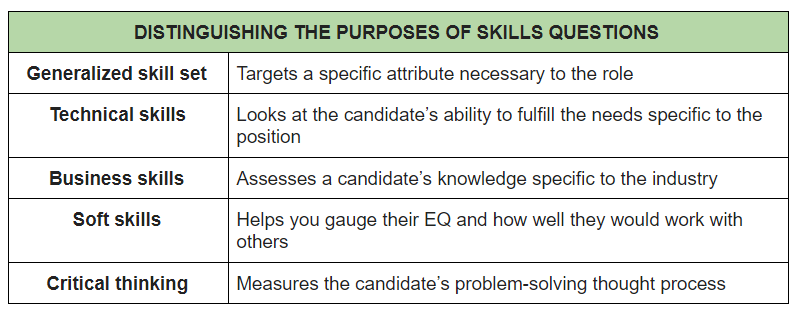
10. Diversity, equity, & inclusion
Don’t wait for candidates to bring up the topic of diversity, equity, and inclusion (DEI). While overviewing the position, explain the company’s policies regarding unbiased hiring, acknowledging race, encouraging parental leave, accepting all gender identities, and more. It may also be wise to mention what HR initiatives have been implemented in the past year to show progress.
Research demonstrates that white participants, regardless of age, tend to perceive Black-sounding names as more threatening. Moreover, they assume characters with these names are physically larger and have lower financial success and social status compared with characters with white-sounding names.
Many candidates are particularly aware of this bias during interviews because assessments are made primarily from names and information on paper before meeting. By bringing it up, you acknowledge their concerns and open the door for conversation about it.
To hear the candidates’ perspective regarding diversity, equity, and inclusion, try interview questions like these:
- Is there anything about these DEI policies that concern you or that you’d like more clarification about?
- How would you want the company to approach diversity, equity, and inclusion in your ideal workplace?
- What is essential for you to know about a company’s DEI values before accepting a job offer?
Remember, the types of interview questions you ask should never be willy-nilly. Refer back to this 101 guide as needed to ensure all questions are thought-out and you know exactly what each assesses.


